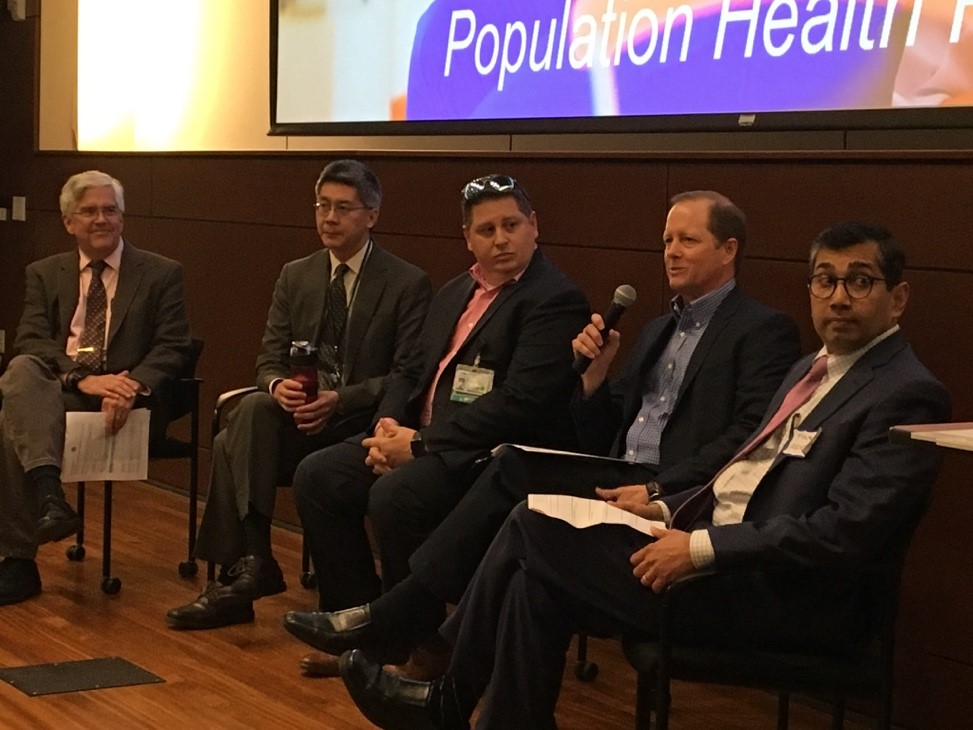By Marissa J. Ventura. UC San Diego Health recently hosted its second annual Population Health Boot Camp. This one-day event gives participants the opportunity to gain in-depth knowledge of population-health tools, including registries, data integration, and strategy. It also allows them to connect with and learn from representatives from a variety of health systems focused on the technical infrastructure used to support population health in value-based care delivery.
The event brought together approximately 100 speakers and participants in population health – an area that looks at the health outcomes of a group of individuals to improve their collective well-being and reduce health-care disparities. Participants represented UC San Diego, UC Davis, UC Irvine, UCLA, UC San Francisco, and many other organizations, including San Diego Sports Medicine, Eisenhower Health, University of Minnesota, Santa Clara Valley Medical Center, and representatives from Epic, the UC electronic medical record (EMR) system vendor.
Amy Sitapati, MD, chief medical information officer (CMIO), UC San Diego Health, and an expert in population health, has championed the boot camp since its inception. Here she answers a few questions about this year’s event.
Q: For you, what was the most important takeaway from this year’s meeting?
Dr. Amy Sitapati (AS): The engine of population health is vibrant and moving forward. Today, we are all transforming infrastructure and building new collaborations, interfaces, data bases, patient outreach, and registries to improve health. Health systems are grappling with the same questions: What are the most important workflows to deliver value? Which predictive risk scores can best help our patients? What will health of the future decade look like?
Q: What key opportunities in the population health arena were discussed?
AS: There were many, but a few I’d like to highlight include:
- Measure what you are doing and look to quantify the pre/post effect of an intervention.
- Improve patient “stickiness” to your organization with engagement tools that include bulk patient outreach.
- Integrate data then extend that into clinically meaningful workflows.
- Build the infrastructure anchored on population health registries and analytics to deliver the health of the future.
Q: Was there an Aha! moment for you at the meeting?
AS: The upcoming opportunity of Integrated Practice Units (IPU) to segment populations of patients and standardize high complexity care delivery is the right model for academic medical centers. The IPU presented in Harvard Business News by Porter & Lee proposes a model for a team of clinical and non-clinical members to improve the coordination, efficiency, and quality of care.
- Do you think the boot camp contributed to knowledge in the field?
AS: Very much so. Everything I have mentioned comes directly from our participants. I’d like to thank the following people for their participation and ideas: Christopher Lillis, MD, UC Davis; Eric Cheng, MD, UCLA; Ryan Peck, UC Davis; Jim Killeen, MD, UC San Diego; Dr. Melissa Famulari, PhD, UC San Diego; Mark Pingel, Epic; Jeffrey Pan and Michael Klade, UC San Diego Health Information Services; and Barbara Berkovich, PhD, UC San Diego Health.
Q: Anything else you would like to add?
AS: A big thanks to our friend and collaborators in this space. Population health takes collaboration to envision the health of our communities. We build a healthier world working together. Hope to see you next year!
 Marissa J. Ventura is communications lead, Information Services and Quality departments, UC San Diego Health
Marissa J. Ventura is communications lead, Information Services and Quality departments, UC San Diego Health

